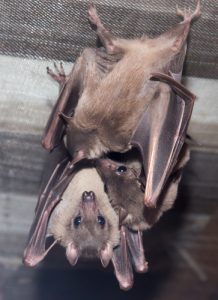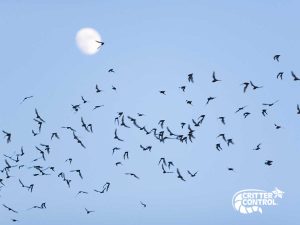
Of the 1,300 species of bats living around the world, there are 13 that are native to Florida. They are all insectivorous, feeding on thousands of insects each night. Some of the bat species form colonies, while others roost alone. Keep reading to learn more about these fascinating and beneficial creatures.
13 Native Florida Bat Species
-
Brazilian Free-Tailed Bat
Their short fur ranges from dark brown to grayish-brown and has a tail that extends past its short tail membrane. They are most often recognized by the strong, musky odor they emit due to a scent gland they have. They roost in large colonies ranging from a few hundred up to several thousand and prefer man-made structures such as buildings and bridges and especially under barrel tile roofs. The Brazilian free-tailed bat is the most common bat in Florida and is found throughout the state excluding the Keys.
-
Southeastern Myotis Bat
These medium-sized bats are found in the northwest panhandle and weigh 5 to 12 grams with gray to brown dorsal fur and yellowish to white fur on the stomach. Typically, they form colonies in caves, hollow trees, bat houses, buildings, bridges, and culverts.
-
Evening Bat
Common throughout all of Florida except in the Keys, evening bats form colonies of about eighty bats in buildings and other man-made structures such as bridges, utility poles, and bat houses. They have brown fur on the back and whitish fur on the stomach with a “dog-like” muzzle.
-
Eastern Red Bat
The Eastern red bat is found in the eastern US and throughout the northern half of Florida. They are solitary creatures, roosting in tree foliage, bushes, and Spanish moss. What makes these bats unique is that the colors between the males and females are different, which is uncommon for bats. Males have brick-red, reddish-orange, or yellowish fur, while females’ fur is duller and lighter.
-
Northern Yellow Bat
The Northern yellow bat is large with thick yellowish to grayish brown fur, perfect for allowing it to be hidden while roosting in the dead palms of sabal palms. They are commonly found throughout Florida except in the Florida Keys.
-
Seminole Bat
Similar in appearance to the Eastern red bat, the Seminole bat has rich mahogany fur with white tips and white on the shoulders and wrists. Solitary, they roost in pine trees and Spanish moss. They are another bat species found in all of Florida except in the Keys.
-
Tricolored Bat
Weighing between 4 and 8 grams, the tricolored bat is Florida’s smallest bat. Its fur ranges from silvery-gray to grayish-yellow to light brown. You can identify a tricolored bat from its pink forearms that contrasts with its black wings. This species roosts singly or in small groups in caves, tree foliage, tree cavities, and sometimes buildings and other man-made structures like sheds or barns.
-
Gray Bat
These bats have gray fur that covers their whole body and weigh between 8 to 10 grams. Gray bats only roost in cave systems and are a federally endangered species found in only one county in the northwest panhandle.
-
Big Brown Bat
Big brown bats have long and silky, wavy, chocolate-brown to reddish or golden-brown fur with a “dog-like” muzzle and weigh between 11 and 25 grams. Their appearance is like the evening bat’s; only they are larger. They typically roost in dead tree cavities throughout the state of Florida except for the Keys, but will also roost in buildings, bridges, and bat houses.
-
Rafinesque’s Big-Eared Bat
Their large, one-inch ears are what sets them apart from other bats. Weighing between 7 and 13 grams, they have grey to brown fur on their back and white fur on their stomach. They roost in small groups in natural roost sites such as hollow trees, tree cavities, and under loose tree bark and are the only species of bat in Florida to collect insects like moths and other soft-bodied insects to eat from tree foliage. Found in different locations, especially in the Florida panhandle and the central and northern portions of the Florida peninsula.
-
Hoary Bat
The largest tree bat and second-largest bat in Florida weighing 20 to 36 grams. They have thick black to gray fur with orange or yellow around their face. The white tips on the end of their hair give them a frosted appearance. They live in northern states and will migrate south to Florida during the winter months. Hoary bats are solitary, roosting in tree cavities, tree foliage, behind loose bark, and in Spanish moss. From October through April, they are found in north and north-central Florida.
-
Velvety Free-Tailed Bat
They are dark brown to dark gray with a long tail that extends past a short tail membrane. In Florida, this species has only been discovered roosting in buildings. Thought to have come from Cuba, the velvety free-tailed bat is only found in the Florida Keys from Key West to Key Largo.
-
Florida Bonneted Bat
Florida’s largest bat weighing between 34 and 47 grams. It has dark gray to brownish-gray fur with a long tail that extends past its uropatagium and large broad ears that join at the base and slant forward over the eyes. They roost colonially in tree cavities, cliff crevices, buildings, and other man-made structures. Found in south Florida excluding the Keys, this species is rare and is on the endangered species list.
Safe and Reliable Bat Removal Services in Orlando
 Bats who roost in buildings will seek homes that allow them to enter small openings in areas such as gable or ridge vents, chimneys, or any other unprotected areas.
Bats who roost in buildings will seek homes that allow them to enter small openings in areas such as gable or ridge vents, chimneys, or any other unprotected areas.
If you have bats roosting in your attic or on your property, contact Critter Control® of Orlando. Our technicians understand the laws regarding exclusion and are equipped with the appropriate tools and knowledge to remove them safely. Once the removal is complete, we will inform you of any necessary repairs or maintenance that should be done to prevent bats or other wildlife from entering your home in the future.
To schedule a home inspection and receive a free estimate for our effective bat removal services, call us today at 407-295-7194.





